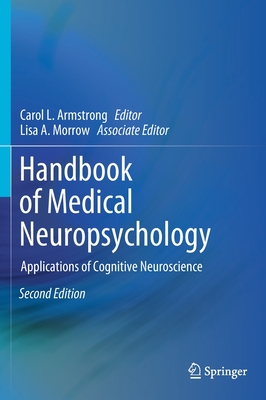Handbook of Medical Neuropsychology: Applications of Cognitive Neuroscience
暫譯: 醫學神經心理學手冊:認知神經科學的應用
Armstrong, Carol L., Morrow, Lisa A.
商品描述
This ambitious and important second edition of the Handbook of Medical Neuropsychology takes an in-depth approach to the medical conditions and methods of neurorehabilitation. Comprehensive in scope and highly detailed in its coverage, the second edition, like the first, characterizes the effects of disease and the impact of interventions in the current state of advanced medicine at a level appropriate both for researchers and for clinicians. Featuring the most up-to-date information and quantitative research on cognitive neuroscience of autism, HIV/AIDS, cancer, head injury, respiratory diseases, endocrine diseases, early birth injury, dementia, and other disorders, the book handles theory, historical background, practical considerations, and controversial areas with evidence based disease indicators, clinical expertise, and real-world insight. It seeks to critique diagnostic and assessment tools specific to disorders. The new chapters in this inclusive second edition reflect the changes in prominent problems found in the clinic and provide worthy insights for research investigation in their review of:
- Substance use disorders.
- Nutrition in neurocognition and mental health.
- Hypothyroidism and Hashimoto's thyroiditis.
- Traumatic brain injury in very early childhood.
- Cognitive functioning in asthma.
- The role of mindfulness in neurorehabilitation.
The Handbook of Medical Neuropsychology, 2nd Edition continues to be an essential resource for the neuropsychology clinician, researcher, practitioner or graduate student. It will be stimulating and relevant reading for years to come.
商品描述(中文翻譯)
這本雄心勃勃且重要的《醫學神經心理學手冊》第二版深入探討了醫療條件和神經康復的方法。第二版的範圍全面且內容詳盡,與第一版相似,描述了疾病的影響以及在當前先進醫學狀態下干預措施的效果,適合研究人員和臨床醫生使用。本書提供了有關自閉症、HIV/AIDS、癌症、頭部受傷、呼吸系統疾病、內分泌疾病、早產傷害、癡呆症及其他疾病的最新資訊和定量研究,涵蓋理論、歷史背景、實務考量及具爭議性的領域,並以基於證據的疾病指標、臨床專業知識和現實世界的見解進行探討。它旨在批判特定於疾病的診斷和評估工具。本版新增的章節反映了臨床上常見問題的變化,並在以下主題的回顧中提供了值得研究的見解:
- 物質使用障礙。
- 神經認知與心理健康中的營養。
- 甲狀腺功能低下症和橋本氏甲狀腺炎。
- 極早期兒童的創傷性腦損傷。
- 哮喘中的認知功能。
- 正念在神經康復中的角色。
《醫學神經心理學手冊,第二版》仍然是神經心理學臨床醫生、研究人員、從業者或研究生的重要資源。未來幾年將會是激勵人心且相關的閱讀材料。
作者簡介
Carol L. Armstrong is a neuropsychologist with the University of Pennsylvania School of Medicine who conducts cognitive neuroscience research and engages in clinical practice; her work began with neurological disorders and diseases such as Alzheimer's dementia, cerebrovascular dementia, multiple sclerosis, head injury, and other diseases and disorders that led to a particular interest in environmental risks for brain injury. With funding from the National Institutes of Health and other agencies, her research evolved into a programmatic focus on neuro-oncology and the effects on the brain from therapeutic irradiation. She has published longitudinal findings on the cognitive and neuroimaging outcomes associated with neural responses to radiotherapy, and discerned them from brain tumor effects. Her work identified the special vulnerability of specific memory systems to injury from radiotherapy, and differentiated them from attention, working memory, and executive functions. Current radiotherapy techniques now protect the hippocampus to the greatest degree possible as part of radiotherapy plans. The pediatric response to therapeutic irradiation shows a different temporal course of post-treatment change in cognition, suggesting a different hippocampal response than that found in adults, and showing that cognition might be a biomarker of radiation effects. The cerebellum is frequently part of the treatment fields for children, and should also be protected as both the hippocampus and cerebellum share the neural mechanisms that make them vulnerable to irradiation.
Dr. Armstrong's long-term interests are the study of memory, attention, and emotion, as well as the cognitive processes affected by white matter disease or injury, and normal effects on white matter as we age. Investigations have focused on resource-limited memory and attention processes, and on the structural distribution of the white matter measure in normal and injured brains. Recent investigations include the comparison of photon versus proton radiotherapy effects on cognition and neuroimaging.
Lisa A. Morrow PhD., retired Associate Professor Emerita, Department of Psychiatry, Western Psychiatric Institute and Clinic, University of Pittsburgh School of Medicine. Dr. Morrow is a retired tenured professor and board-certified neuropsychologist with over 35 years experience in clinical and epidemiological research. Her NIH-funded research focused on neurobehavioral and psychiatric functioning in adults with cognitive deficits resulting from various medical disorders, exposure to neurotoxins, and cognitive decline in older individuals with dementia due to Alzheimer's disease, stroke, and Parkinson's disease. Dr. Morrow helped to develop and publish several normative studies of neuropsychological tests and test batteries, including a computer-based assessment of mild memory impairment to aid in the early detection of mental status changes in the elderly. Dr. Morrow has published over 70 peer-reviewed papers and chapters in major medical and psychological journals, and this research has been acknowledged from a number of professional and neuropsychological organizations.
作者簡介(中文翻譯)
卡羅爾·L·阿姆斯特朗是賓夕法尼亞大學醫學院的神經心理學家,從事認知神經科學研究並參與臨床實踐;她的工作始於神經系統疾病和障礙,如阿茲海默症、腦血管性癡呆、多發性硬化症、頭部受傷以及其他導致對環境風險產生特別興趣的疾病。她的研究獲得了國家衛生研究院及其他機構的資助,逐漸演變為對神經腫瘤學的計畫性關注,以及治療性輻射對大腦的影響。她發表了關於與放射治療的神經反應相關的認知和神經影像學結果的縱向研究,並將其與腦腫瘤的影響區分開來。她的工作確定了特定記憶系統對放射治療造成的損傷的特殊脆弱性,並將其與注意力、工作記憶和執行功能區分開來。目前的放射治療技術在放射治療計畫中,已盡可能保護海馬體。兒童對治療性輻射的反應顯示出與成人不同的認知後治療變化的時間過程,這表明海馬體的反應與成人不同,並顯示認知可能是輻射影響的生物標記。小腦經常是兒童治療範圍的一部分,應該得到保護,因為海馬體和小腦共享使其對輻射脆弱的神經機制。
阿姆斯特朗博士的長期興趣是記憶、注意力和情緒的研究,以及白質疾病或損傷影響的認知過程,以及隨著年齡增長對白質的正常影響。研究集中於資源有限的記憶和注意力過程,以及正常和受傷大腦中白質測量的結構分佈。最近的研究包括比較光子與質子放射治療對認知和神經影像學的影響。
莉莎·A·莫羅博士,退休的副教授,匹茲堡大學醫學院西方精神病學研究所及診所精神病學系。莫羅博士是一位退休的終身教授和經過認證的神經心理學家,擁有超過35年的臨床和流行病學研究經驗。她的NIH資助研究專注於因各種醫療疾病、接觸神經毒素以及因阿茲海默症、中風和帕金森病導致的認知衰退而出現認知缺陷的成年人神經行為和精神功能。莫羅博士幫助開發並發表了幾項神經心理測試和測試電池的標準研究,包括一種基於計算機的輕度記憶障礙評估,以幫助早期檢測老年人的心理狀態變化。莫羅博士在主要醫學和心理學期刊上發表了超過70篇經過同行評審的論文和章節,這項研究得到了多個專業和神經心理學組織的認可。











